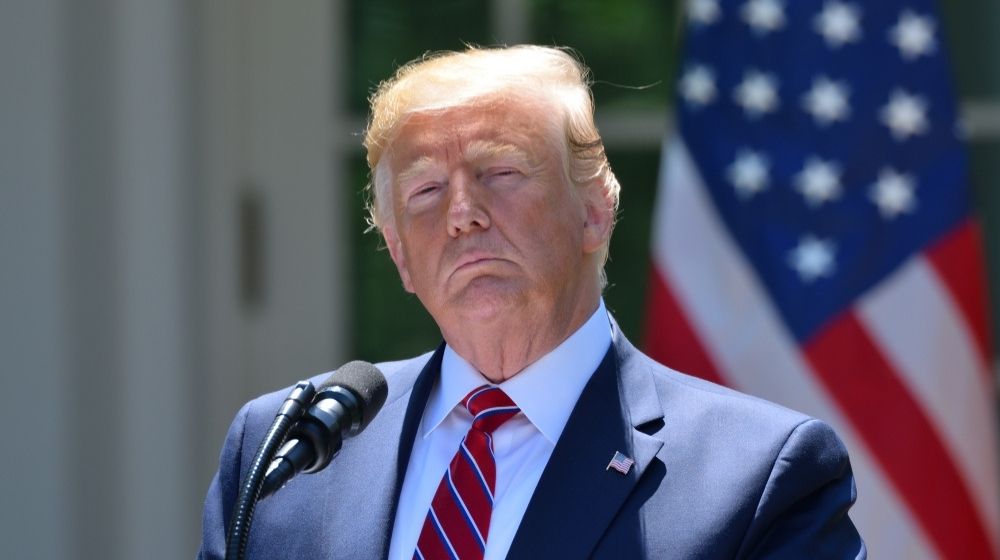Breaking News
Trump Vetoes Massive Defense Bill. Here’s the Real Reason

U.S. President Donald Trump has vetoed a massive defense bill. This move essentially pits him against his Republican allies in Congress.
On Wednesday, Trump has blocked the 4,517-page National Defense Authorization Act. The said act lays out Pentagon policies and $740 billion in spending.
BREAKING:
President Trump just vetoed Congress’s insane spending bill
Good!
RT if not a single dime of taxpayer dollars should go overseas while millions of Americans are out of a job!
— Charlie Kirk (@charliekirk11) December 23, 2020
The president’s primary reason for the veto is that Congress failed to amend Section 230 — a section that protects tech companies from liabilities from what they post on the website. However, he has also outlined a few other reasons for this move.
BREAKING: Pres. Trump vetoes the $740 billion defense spending bill, citing a lack of action taken on Section 230 saying it "facilitates the spread of foreign disinformation online … a serious threat to our national security." pic.twitter.com/tUHczTI3NC
— Alex Salvi (@alexsalvinews) December 23, 2020
In his veto message, which was sent to the House of Representatives, the president said: “ My Administration recognizes the importance of the Act to our national security. Unfortunately, the Act fails to include critical national security measures, includes provisions that fail to respect our veterans and our military’s history, and contradicts efforts by my Administration to put America first in our national security and foreign policy actions.”
He followed this up by describing the bill as a “‘gift’ to China and Russia.”
On Section 230
The president stated that Congress has failed to make significant amendments on Section 230 of the Communications Decency Act. This is despite calls from both parties, stating the need to make changes.
Section 230 essentially protects big tech companies from liabilities for whatever they post on their website. This can result in the fast spread of misinformation over the internet. This also makes things difficult for the intelligence department to conduct operations. The provision will let everyone know what the department’s every move is.
Trump said that this failure to amend Section 230 poses a serious security risk for the country. He then emphasized, once again, the need to repeal it. “Section 230 facilitates the spread of foreign disinformation online, which is a serious threat to our national security and election integrity.”
Apart from issues with Section 230, the act also includes language that would have changed the way military installations are named. The president emphasized that in his administration he places value in the service and sacrifices of military personnel, and he wants to honor their legacy and history by preserving tradition.
Defense Bill Contradicts Administration's Foreign Policy
The president also mentions that the bill limits “the President’s ability to preserve our Nation’s security” in a few ways. First, it limits the funds the administration can use for military construction. The funds could supposedly be used in response to a national emergency.
Multiple provisions in the defense bill also contradict the president's foreign policy, particularly with regards to sending deployed servicemen and women back home.
“Not only is this bad policy, but it is unconstitutional,” Trump said in his letter
“Article II of the Constitution makes the President the Commander in Chief of the Army and Navy of the United States and vests in him the executive power. Therefore, the decision regarding how many troops to deploy and where, including in Afghanistan, Germany, and South Korea, rests with him,” the president argued.
“The Congress may not arrogate this authority to itself directly or indirectly as purported spending restrictions,” he added.
Earlier this month, the NDAA bill passed Congress for the 60th year. The Senate approved it 84-14. On the other hand, the House approved it 335-78. This means that Congress has more than two-thirds in support of the bill — a supermajority which can override Trump’s veto.
Congress has announced voting sessions to override the move, which will take place next week. The House will meet Monday to override the president’s veto, while the Senate will follow suit on Tuesday.
Up Next:
